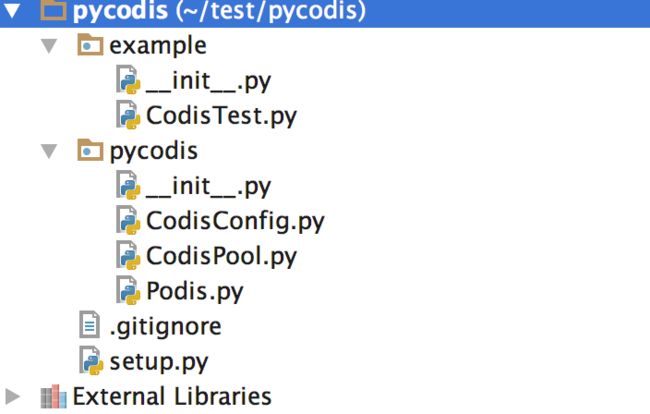在使用codis时候,我们遇到的场景是,公司提供了HA的Proxy(例如N个),但是不暴露zookeeper(也就是说没有codis后端服务列表)。
如果暴露zk的话,可以看这一篇,http://www.cnblogs.com/kangoroo/p/7485760.html
要求在开发客户端api的过程中,自己进行探活&故障摘除&负载均衡。
我这里做了一个简单的实现,提供给大家参考。本实例支持使用在server或者daemon中。
我们的实现叫做pycodis。
1、核心文件CodisPool.py
在这个文件里,实现了多服务端实例链接,探活与故障摘除,负载均衡策略(随机&roundrobin)。
1)探活
由于公司不暴露CodisProxy的zookeeper,我们在编写客户端程序的时候无法获取活跃的codisProxy服务列表。我们不得不自己去探活并且保存活跃的服务列表。
我们通过在初始化CodisPool实例时候,启动了后台线程_check_available_backgroud,去轮询配置的codisProxy列表,我们的探活与摘除满足以下3个要求:
a)如果在一定的阈值时间段内(默认3s),某个codisProxy始终无法提供服务,就暂时将它从codisProxy列表中摘除;
b)被摘除的codisProxy实例无法通过get_connection得到,但是在codisProxy列表中保留它,让它可以在满足条件的情况下复起;
c)当被摘除的codisProxy恢复了,就把它放到可用codisProxy列表中,这样通过get_connetion又能拿到它。
注:这里通过get_connection拿到的proxy,其实现方式是redis链接池。
2)负载均衡
我们通过get_connection这个函数在proxy列表中得到一个可用链接,那么获取可用链接的负载均衡算法是怎样的呢?
PickUp抽象类,定义了负载均衡类需要实现的方法,pick_up()。
我们实现了两种负载均衡算法:
a)RandomPickUp,随机负载均衡
b)RoundRobinPickUp,轮询负载均衡
3)单例模式的保证
为了不至于在程序运行时创建很多的链接池实例,这是违反设计初衷的,链接池就没有意义了,我们需要实现为线程安全的单例模式。
在CodisPool实现中只保证了不会额外建立太多的链接池--我们在__init__中一次性创建好了Podis实例,并且放入到proxy列表中。单例模式留待使用中去实现,最简单的方式是,在python的module中先把CodisPool的实例建立好。然后其他的线程在去访问。可以参考我们的example实例。
# -*- coding:utf-8 -*- import abc import uuid import time import logging import traceback import threading import redis from Podis import Podis logger = logging.getLogger(__name__) class CodisPool(object): def __init__(self, codis_config): self._pool_shards = [] self._availables = [] self._connection = None self._create_pool(codis_config) self._check_available_backgroud() def _check_available_backgroud(self): bg = Background(self._check_pool_shards) bg.start() def _create_pool(self, codis_config): address_list = codis_config.get('addrs').split(',') for address in address_list: host = address.split(':')[0] port = address.split(':')[1] self._pool_shards.append( Podis( redis.ConnectionPool( host=host, port=port, db=0, password=codis_config.get('password'), max_connections=codis_config.get('max_connections') ) ) ) self._availables.append(True) if len(self._pool_shards) == 0: logger.error('创建codis链接池失败') raise Exception('创建codis链接池失败') def _check_pool_shards(self): while True: self._pool_shards_is_available() def _pool_shards_is_available(self, retry_num=3): i = 0 for pool in self._pool_shards: try: retry = retry_num go_on = True while go_on and retry > 0: try: pong = pool.ping() if not pong: retry -= 1 else: go_on = False except Exception, ex: retry -= 1 raise finally: time.sleep(1) if retry <= 0: self._availables[i] = False else: self._availables[i] = True except Exception, ex: logger.error(traceback.format_exc()) finally: i += 1 def _get_available_shards(self): i = 0 available_shards = [] for shard in self._pool_shards: if self._availables[i]: available_shards.append(shard) i += 1 return available_shards def get_connection(self, pick_up=None): if isinstance(pick_up, PickUp): codisPool = pick_up.pick_up(self._get_available_shards()) else: pick_up = RandomPickUp() codisPool = pick_up.pick_up(self._get_available_shards()) return codisPool def get_pool_shards(self): return self._pool_shards def get_availables(self): return self._get_available_shards() class Background(object): def __init__(self, target, daemon=True): self.daemon = daemon self.thread = threading.Thread(target=target) def start(self): self.thread.setDaemon(self.daemon) self.thread.start() class PickUp(object): __metaclass__ = abc.ABCMeta @abc.abstractmethod def __init__(self): pass @abc.abstractmethod def pick_up(self, pool_list): return class RandomPickUp(PickUp): def __init__(self): PickUp.__init__(self) def pick_up(self, pool_list): pool_size = len(pool_list) index = abs(hash(uuid.uuid4())) % pool_size pool = pool_list[index] print "RandomPickUp, 拿到第", index, "个pool" return pool class RoundRobinPickUp(PickUp): def __init__(self): PickUp.__init__(self) self.index = 0 self.round_robin_lock = threading.Lock() def pick_up(self, pool_list): with self.round_robin_lock: pool_size = len(pool_list) self.index += 1 index = abs(self.index) % pool_size pool = pool_list[index] print "RoundRobinPickUp, 拿到第", index, "个pool" return pool
2、Podis,实际的句柄资源
在CodisPool获得的句柄就是本类的一个实例。
# -*- coding:utf-8 -*- import redis import logging import traceback logger = logging.getLogger(__name__) def redis_getter(func): def wrapper(*args, **kwargs): try: result = func(*args, **kwargs) return result or None except Exception, ex: logger.error(traceback.format_exc()) raise return wrapper def redis_setter(func): def wrapper(*args, **kwargs): try: func(*args, **kwargs) return True except Exception, ex: logger.error(traceback.format_exc()) raise return wrapper class Podis(object): def __init__(self, pool): self._connection = redis.StrictRedis(connection_pool=pool) @redis_getter def ping(self): return self._connection.ping() @redis_getter def get(self, key): return self._connection.get(key) @redis_setter def set(self, key, value): self._connection.set(key, value) @redis_setter def lpush(self, key, *value): self._connection.lpush(key, *value) @redis_getter def lpop(self, key): return self._connection.lpop(key) @redis_getter def lrange(self, key, start, end): return self._connection.lrange(key, start, end) @redis_setter def sadd(self, key, *value): self._connection.sadd(key, *value) @redis_setter def srem(self, key, *value): self._connection.srem(key, *value) @redis_getter def zrange(self,key,start,end): return self._connection.zrange(key,start,end) @redis_getter def zrevrange(self,key,start,end): return self._connection.zrevrange(key,start,end,withscores=True) @redis_getter def zscore(self,key,*value): return self._connection.zscore(key,value) @redis_setter def zadd(self,key,score,*value): self._connection.zadd(key,score,value) @redis_getter def smembers(self, key): return self._connection.smembers(key) @redis_getter def hgetall(self, key): return self._connection.hgetall(key) @redis_getter def hget(self, key, name): return self._connection.hget(key, name) @redis_getter def hkeys(self, key): return self._connection.hkeys(key) @redis_setter def hset(self, key, name, value): self._connection.hset(key, name, value) @redis_setter def hmset(self, name, mapping): self._connection.hmset(name, mapping) @redis_setter def hdel(self, key, name): self._connection.hdel(key, name) @redis_setter def delete(self, *key): self._connection.delete(*key) # codis不支持 @redis_getter def keys(self, pattern): return self._connection.keys(pattern) @redis_setter def expire(self, key, time): return self._connection.expire(key, time) @redis_getter def ttl(self, key): return self._connection.ttl(key)
3、配置文件CodisConfig.py
这里我没有对最大连接数,超时时间等等做配置,你可以根据你的场景自行添加。
codis_config = { 'addrs': '100.90.186.47:3000,100.90.187.33:3000' }
4、单测和使用
我们模拟在并发场景下,对资源的获得和释放情况。
import time import threading from pycodis.CodisConfig import codis_config from pycodis.CodisPool import CodisPool, RoundRobinPickUp codis_pool1 = CodisPool(codis_config) print '------1-------' pick_up1 = RoundRobinPickUp() print '------2-------' codis_pool2 = CodisPool(codis_config) print '------3-------' pick_up2 = RoundRobinPickUp() print '------4-------' def func(i): for i in range(10): podis1 = codis_pool1.get_connection(pick_up=pick_up1) podis2 = codis_pool2.get_connection(pick_up=pick_up2) podis1.delete(i) podis2.delete(i) time.sleep(1) thread_list = [] for i in range(100): thread_list.append(threading.Thread(target=func, args=[i])) for thread in thread_list: thread.setDaemon(True) thread.start() time.sleep(10)
可以看到打印的信息,每次都不一样
------1------- ------2------- ------3------- ------4------- RoundRobinPickUp, 拿到第 1 个pool RoundRobinPickUp, 拿到第 RoundRobinPickUp, 拿到第 01 个pool 个pool RoundRobinPickUp, 拿到第 0 个poolRoundRobinPickUp, 拿到第 1 个pool RoundRobinPickUp, 拿到第 1RoundRobinPickUp, 拿到第 个pool 0 个pool RoundRobinPickUp, 拿到第 RoundRobinPickUp, 拿到第0 个pool 1 个pool RoundRobinPickUp, 拿到第 RoundRobinPickUp, 拿到第 10 个pool RoundRobinPickUp, 拿到第个pool 1RoundRobinPickUp, 拿到第 个pool RoundRobinPickUp, 拿到第 00 个pool个pool RoundRobinPickUp, 拿到第 1RoundRobinPickUp, 拿到第 个pool 1 个poolRoundRobinPickUp, 拿到第 0RoundRobinPickUp, 拿到第 0 个pool RoundRobinPickUp, 拿到第 1 个pool 个pool RoundRobinPickUp, 拿到第 RoundRobinPickUp, 拿到第 01 个pool 个pool RoundRobinPickUp, 拿到第 RoundRobinPickUp, 拿到第 10 个pool个pool RoundRobinPickUp, 拿到第 RoundRobinPickUp, 拿到第 1 个pool 0 RoundRobinPickUp, 拿到第 个pool RoundRobinPickUp, 拿到第 0 个pool1 RoundRobinPickUp, 拿到第个pool 1 个poolRoundRobinPickUp, 拿到第 RoundRobinPickUp, 拿到第 0 0个pool RoundRobinPickUp, 拿到第 个pool1 个poolRoundRobinPickUp, 拿到第 RoundRobinPickUp, 拿到第 10 个pool 个pool RoundRobinPickUp, 拿到第 0RoundRobinPickUp, 拿到第 个pool 1 个poolRoundRobinPickUp, 拿到第 1 个pool RoundRobinPickUp, 拿到第 RoundRobinPickUp, 拿到第 0 个pool 0 个pool RoundRobinPickUp, 拿到第RoundRobinPickUp, 拿到第 1 个pool 1 个poolRoundRobinPickUp, 拿到第 0 个pool RoundRobinPickUp, 拿到第RoundRobinPickUp, 拿到第 0 个pool RoundRobinPickUp, 拿到第 11 个pool个pool
